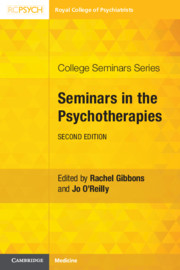Book contents
- Seminars in the Psychotherapies
- College Seminars Series
- Seminars in the Psychotherapies
- Copyright page
- Reviews
- Contents
- Contributors
- Foreword
- Preface
- Part I Therapy Theory and Practice
- Part II Applied Psychotherapeutic Thinking
- Section 1 Psychological and Psychodynamic Approaches to Psychiatry
- Section 2 Work in Practice
- Chapter 21 The Effect on Staff and Organisations of Working with Patients with Psychotic Illness
- Chapter 22 Introduction to Organisational Dynamics
- Chapter 23 Reflective Practice and Its Central Place in Mental Health Care
- Chapter 24 Working Psychotherapeutically with Children
- Chapter 25 Therapeutic Communities
- Section 3 Contemporary Developments
- Index
- References
Chapter 22 - Introduction to Organisational Dynamics
from Section 2 - Work in Practice
Published online by Cambridge University Press: 27 May 2021
- Seminars in the Psychotherapies
- College Seminars Series
- Seminars in the Psychotherapies
- Copyright page
- Reviews
- Contents
- Contributors
- Foreword
- Preface
- Part I Therapy Theory and Practice
- Part II Applied Psychotherapeutic Thinking
- Section 1 Psychological and Psychodynamic Approaches to Psychiatry
- Section 2 Work in Practice
- Chapter 21 The Effect on Staff and Organisations of Working with Patients with Psychotic Illness
- Chapter 22 Introduction to Organisational Dynamics
- Chapter 23 Reflective Practice and Its Central Place in Mental Health Care
- Chapter 24 Working Psychotherapeutically with Children
- Chapter 25 Therapeutic Communities
- Section 3 Contemporary Developments
- Index
- References
Summary
This chapter introduces an approach used by the author, an experienced organisational consultant and senior manager in caring organisations, to organisational dysfunction. The author describes how combining his training experience as a psychoanalyst and in organisational consultancy allows key ideas from psychoanalytic and open systems theories to be combined as the bedrock of his approach.
- Type
- Chapter
- Information
- Seminars in the Psychotherapies , pp. 285 - 297Publisher: Cambridge University PressPrint publication year: 2021

